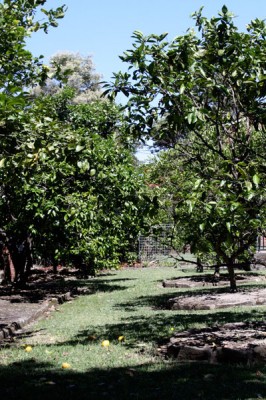The Australian Gardener

My late Grandfather was an avid gardener. He had more than half of his very large Sydney backyard dedicated to the growing of fruit and vegetables. I was lucky enough to inherit a couple of his gardening books of which were both first published in the 1950’s.
I am lucky enough to have access to the small family garden where we grow simple things such as lettuce, capsicums, tomatoes, spinach and an assortment of herbs all quite successfully (once we cage the possums out). However, soon after planting some beans I realised that they were suffering from caterpillar destruction. So I opened “The Australian Garden Book” by Reginald George Edwards and turned to chapter XVIII: “Insect Pests and their control” which, to my surprise, told me that…
“During early settlement in Australia we were misguided enough to burn or ring-bark millions of acres of forest in low rainfall areas in order that the grass should grow where giant trees had provided sanctuary for centuries for countless insectivorous birds. The poison cart [sic], gun, rifle, trap, fox, domesticated cat and motor-car then came along to in their turn and all helped to reduce the bird population, with the result that the insect hordes, finding the country deserted by their natural enemies, increased enormously.”
Thi is a profound quote to come out of the 1950’s. One view, which if it had been mainstream at the time, would have seen us in a much better situation vis-à-vis environmental catastrophe that we find ourselves in now. Mr Edwards is right in saying thousands of species of birds were driven to extinction in this early period of colonisation. Another book I have read, “The Fatal Shore” by Robert Hughes, backs this up by mentioning the millions of parrots who inhabited Sydney cove in 1788 which are no longer seen. So my beans were being destroyed by a lack of birds (however I do have lots of skinks). Honestly, my garden has many birds in it. We have lots of resident Noisy Mynors who, despite being a bossy mono-culture keen on urban avian cleansing, keep my veggies free of pests. However that’s upstairs. For some reason they don’t go down the side of the house where the beans are and where I need them so I continued on in chapter XVIII past the tales of woe to the descriptions on how to kill things.

I skipped past the methods by which to exterminate Slugs and Snails, Springtail, Earwig, Slater, Stem Caterpillar, Mole Cricket, Fig-leaf Beetle, Dicky Rice Weevil, Fruit-tree Borer, Beet Web-worm and Cypress-pine Borer until I found Grubs and Caterpillars.
“Most grubs and caterpillars can be killed on plants by spraying with arsenate of lead. DDT if dusted on to foliage that sheds spray will also be found an effective stomach poison for most leaf and flower eaters. Derris-root powder and DDT are also effective stomach poisons for most caterpillars.”
Lead arsenate and Dichloro-Diphenyl-Trichloroethane were used liberally before and after the publication of The Australian Gardener. In the mid 80’s both chemicals were banned as insecticides after their negative effects were brought to light by the children of those who constructed the chemicals for the first time. This brings us to the reason I wrote this blog entry. It’s the sheer contrast of understanding and mis-understanding that Mr Edwards relays in his book which at the time would have seemed perfectly innocent. However with the aid of hindsight, it’s quite the opposite. Whilst I know little of his views outside of gardening, I know from what he wrote that he understood the concequences of the destructive ways of man-kind at the same time as having no inkling of the concequences of his own actions. This made me think about how we are (and no doubt will forever be) in a very similar situation. Our utilisation of intensive agriculture practices and genetic modification to squeeze as much as we can from the Earth will have concequences, but what are they? The destruction of The Rhizosphere? Personally I think it’s the things that we take for granted that will effect us the most.